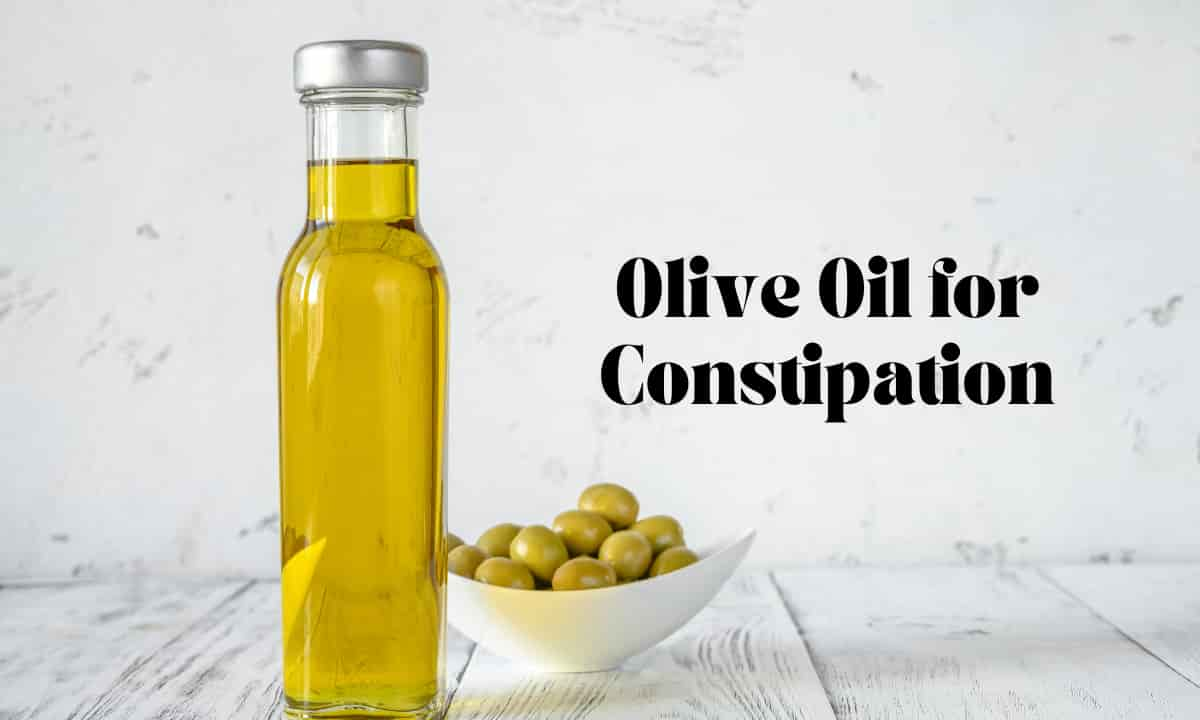Why You Should Start Using Olive Oil for Constipation
From cooking to cosmetics, olive oil has many uses. But did you know that it can also be used to help relieve constipation?
Table of Contents
ToggleIn this article, we’ll discuss the benefits of using olive oil for constipation, and we’ll provide some tips on how to use it safely and effectively.
How Olive Oil can Help Constipation

Although olive oil is not considered a laxative, it does provide a mild laxative effect for some individuals.
This is one of the ways it works: when constipated, stools are hard and dry, making it difficult to produce a bowel movement.
Using olive oil for constipation can make stools easier to pass as the rich fats can lubricate the inside of the bowel. What’s more, the oil will soften stool by encouraging water retention.
Basically, olive oil works the same as a stool softener.
The antioxidants in olive oil also help reduce inflammation in the GI tract and improve gut health overall.
How Olive Oil can Help Constipation
To get the most out of olive oil for constipation relief, look for extra virgin or cold-pressed types. These contain higher levels of antioxidants compared to regular olive oils.
What is the Ideal Dose?

One to two tablespoons of this type of olive oil per day helps alleviate constipation. However, there is no standardized dose based on science.
Olive oil for constipation can either be taken alone or mixed with other foods.
If you don’t like the taste of the oil, try mixing it with some fruit juice or Greek yogurt for a smoother flavor.
Potential Side Effects
Olive oil is generally considered safe and effective as a natural constipation remedy for most people.
Most laxatives provide painful side effects such as bloating, cramping, and nausea. Olive oil is a natural alternative that has minimal side effects.
Some users report diarrhea following using olive oil to treat constipation. This typically only occurs when consuming it in excess.
Olive oil for constipation is not recommended for young children or babies.
What Causes Constipation?

Chronic constipation impacts up to 27% of the population and greatly reduces the individuals’ quality of life.
Constipation is defined as less than three bowel movements per week and difficulty passing stools.
Symptoms of constipation include straining, hard or painful stools, and no sense of relief following a bowel movement.
Many factors can contribute to the onset of constipation, including:
- Sedentary lifestyle
- Diet low in fiber
- Dehydration
- Medications
- Certain diseases
Constipation can also be caused by hormonal changes such as menopause.
Other Treatments for Constipation
Eat Fiber

Consuming a fiber-rich diet is key in treating and preventing constipation. Fiber absorbs water, adds bulk to the stool and softens it.
According to the Academy of Nutrition and Dietetics, 25 grams of fiber for women and 38 grams of fiber for men is recommended per day.
Drink Enough Water
Hydration is very important if you are experiencing constipation. When you don’t consume sufficient water, stools become dry and painful to pass.
Move More
Exercise can also stimulate bowel movements. Activity can trigger a bowel movement by increasing blood flow to the abdomen and colon.
Adults should aim for 150 minutes of moderate-intensity exercise per week and two days of strength training, as per CDC guidelines.

Honor Your Body
Honoring the urge to use the restroom is beneficial in maintaining regularity.
Also, maintaining a regular toileting schedule can be beneficial in avoiding constipation. Trying to have a bowel movement at the same time each day will promote regularity.
Relax!
When attempting to have a bowel movement, it’s important to be relaxed and comfortable. Your posture on the toilet can also alleviate constipation.
Sitting with your knees slightly higher than your hips with the use of a foot stool allows the stool to exit more easily.
Additional Oils for Constipation
Olive is not the only oil that can be used to ease constipation. Other oils such as mineral, flaxseed, and castor have also proved valuable in treatment for this condition.
Castor oil is a stimulant laxative. It contains a fatty acid, known as ricinoleic acid that causes the muscles to contract and produce a bowel movement.
Mineral oil is a lubricant laxative.It l works in a similar way to olive oil by retaining water in the intestines to soften the stool and make it easier to pass.
Flaxseed oil also promotes bowel movements by softening stools in the intestines.
It’s worth noting that these oils may have a more aggressive laxative effect on the body than olive oil.
Other Health Benefits of Olive Oil
Olive oil has been associated with a wealth of health benefits, contributing to its popularity.
It’s rich in healthy fats; monounsaturated fats are known to reduce HDL, also known as ‘bad’ cholesterol. Consuming healthy fats can, therefore effectively lower the risk of heart disease and stroke.
Further, olive oil contains powerful antioxidants such as polyphenols. Polyphenols are powerful tools in the diet which can improve blood pressure, systemic inflammation, lipid profiles, and insulin resistance.
Extra-virgin olive oil—its most pure form—boasts the most health benefits. It is a key component of the healthful Mediterranean diet. This form of olive oil has been linked with reduced risk of cardiovascular disease, type 2 diabetes, and brain inflammation.
Impressively, incorporating extra-virgin olive oil in your diet appropriately can even protect against memory loss and dementia.
Bottom Line: Should I use Olive Oil for Constipation?
There are many remedies to treat constipation, and it can be difficult to know which will work best for you.
Olive oil can alleviate constipation by lubricating the bowel and promoting water retention to soften stools, leading to easier bowel movements. Further, as a natural alternative to harsh laxatives, olive oil has no side effects for most users when used correctly.
Along with its mild laxative effect, olive oil has many promising health benefits.
If you are looking for a natural remedy to ease constipation, olive oil is a great option.
“Why You Should Start Using Olive Oil for Constipation” was written by soon-to-be Registered Dietitian Stephanie Maurici. Edited by Dr. Su-Nui Escobar, RDN.

Dr. Su-Nui Escobar, a Registered Dietitian/Nutritionist in Miami, FL, is dedicated to empowering women in perimenopause and menopause to live healthier, more satisfying lives.
With a doctorate in clinical nutrition from the University of North Florida, she has expertise in menopause and weight loss, including the unique challenges faced by those on weight loss medications.
Su-Nui’s passion for her field is evident in her previous role as the Academy of Nutrition and Dietetics spokesperson.



2 thoughts on “Why You Should Start Using Olive Oil for Constipation”
I’m glad I found this article! I’ve been struggling with constipation for a while now, and I’m always looking for ways to help relieve it. I’m going to try using olive oil, and I’m hopeful that it will help me to get things moving again. Thanks for sharing!
It works for many people! hope it also works for you 🙂